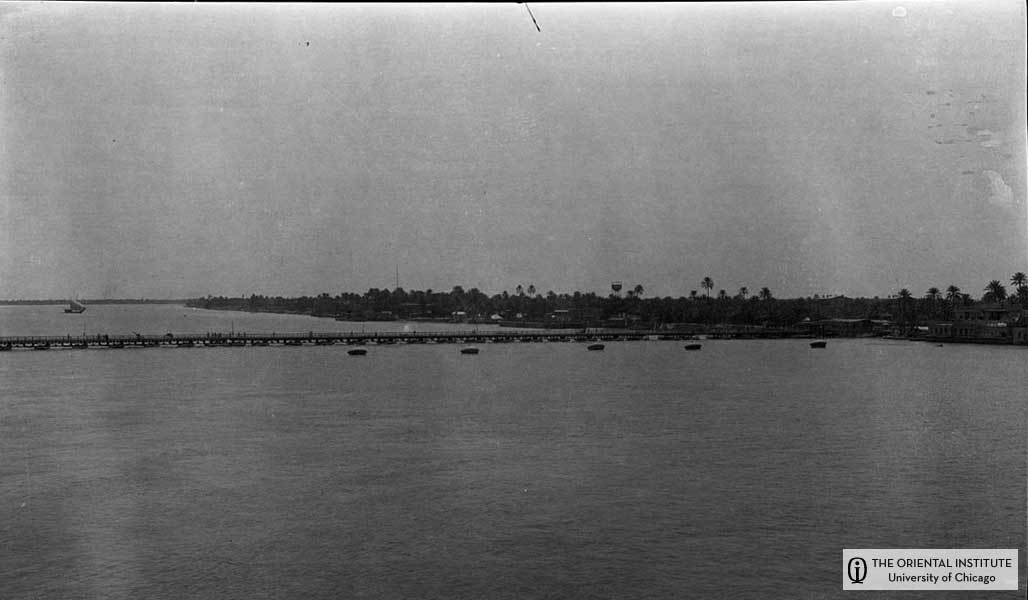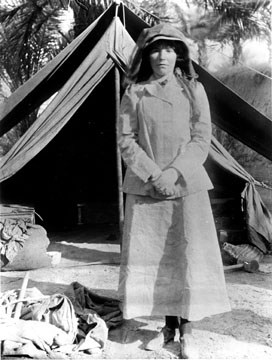General Hambro's House, Baghdad, Mesopotamia
April 10, 1920
Abbas has brought in the early morning tea which everybody in the eastern region of the Near East has served at his bed-side, following the custom in India. I find it very welcome and refreshing in this enervating climate. As there is still a little while before breakfast I will endeavor to finish this letter. We had dinner last night on the general’s huge veranda overhanging the broad Tigris, and looking far up and down the river and across to the palm groves on the other side. It seemed incongruous enough to watch the lines of electric lights along the shores, marking also the lines of the two bridges of boats which connect the two sides of the river here.
 Baghdad: A view along the Tigris showing the bridge of boats. (N. 3695, P. 7255)
Baghdad: A view along the Tigris showing the bridge of boats. (N. 3695, P. 7255)
The evening air is delightfully balmy and cool, and the lapping of the waters is drowsily soothing, as the Indian servants bring in the dinner, — a very good one too. This evening the general has invited Gertrude Lowthian Bell to dinner. You perhaps remember her. We began once to read aloud one of her books, “From Amurath to Amurath”, I think. She is an English woman who has been out here among the Arabs, like Lady Hester Stanhope, for some 25 years, — of course no longer young, and a terrible blue stocking, but I have no doubt an interesting woman.
 Gertrude Bell in Iraq in 1909 (public domain image courtesy of Wikimedia Commons)
Gertrude Bell in Iraq in 1909 (public domain image courtesy of Wikimedia Commons)
That reminds me that Mrs. Warren left here for Persia a day or two ago. Luckenbill called on her, but I did not see her. It is not likely that our paths will cross again, and as she is getting what she wants through her Y.M.C.A. connection, and she will not need to ask us for anything. General Hambro has just stepped in and says, “Tell your wife that an English general who knows without being told, how the arch of Ctesiphon was built, says you are looking fine”. Now that, as a message to an archaeologist’s wife, strikes me as pretty good. You note how he qualifies, before he gives you his opinion! And it is true that he explained to me his idea of how the vast arch was put up, before we went out there, and he was quite right. I think therefore he is quite qualified to report on the exterior of an archaeologist! Hambro is a prince of a man! A man of independent wealth, who after 27 years in the army, — the last five from August 1914 to August 1919 in constant service in France, — comes out to these new dependencies of the British Empire, involving life in the hottest region on the globe and separation from his wife and children, to aid his nation in carrying this huge new burden of responsibility. He has charge of all the railways (as Q.M.G, Quartermaster General), all the river transport, much of overseas transport, and absolutely all stores and supplies, including those necessary to feed 40,000 refugees from Armenia at the Bakuba camp near Baghdad. He disburses some 250 or 300 million dollars a year, has of course a huge organization under him, goes to his office every morning at 8:30, takes only an hour for lunch, does not come home for tea nor have it served in his office, and does not leave his desk until seven in the evening. This programme is relieved only by short trips of inspection. A man in business life doing this job would receive at least $50,000 a year. He gets a thousand pounds, one third of which is at once absorbed by income tax, and another third by the unfavorable rate of exchange, leaving him about 333 pounds or perhaps $1300 at the present rate of exchange! But he likes it, finds it interesting, and puts his whole energy into it. But when the Hearst newspapers talk about English land-grabbing, and English colonial servants lolling about in luxurious bungalows, living a life of ease and idleness at the expense of oppressed and toiling subject races, they are simply practicing their usual monumental lying, administered to a gullible American public in millions of daily two-cent doses, to the profit of the fat Hearst bank accounts.
For the full story of my exciting trip you should come to the special exhibit “Pioneers to the Past: American Archaeologists in the Middle East, 1919-1920,” at the Oriental Institute!
1155 East 58th Street Chicago, IL 60637
Hours:
- Tuesday 10:00 am to 6:00 pm
- Wednesday 10:00 am to 8:30 pm
- Thursday 10:00 am to 6:00 pm
- Friday 10:00 am to 6:00 pm
- Saturday 10:00 am to 6:00 pm
- Sunday noon to 6:00 pm
- Closed Mondays
http://oi.uchicago.edu/museum/special/pioneer/
And visit me on facebook at: http://www.facebook.com/profile.php?id=3318774#/profile.php?v=info&ref=profile&id=100000555713577